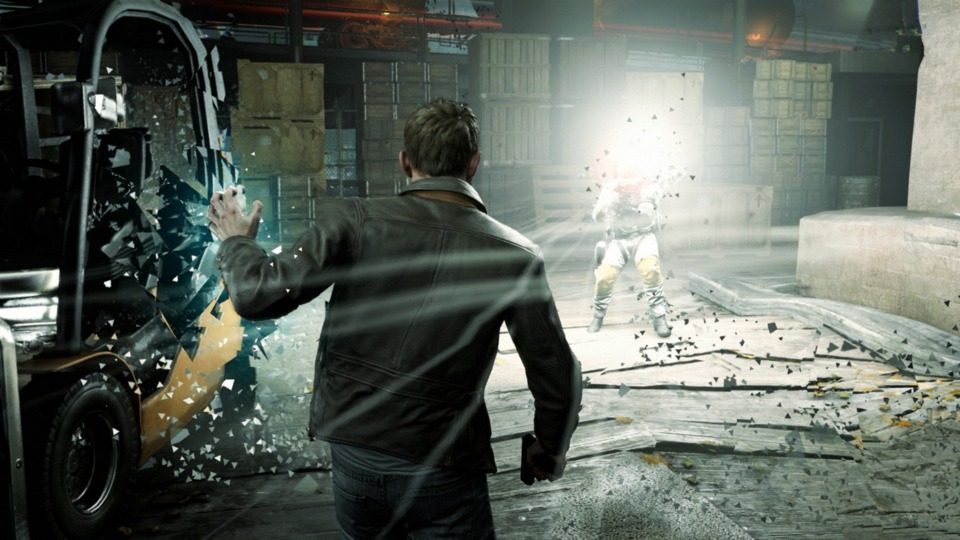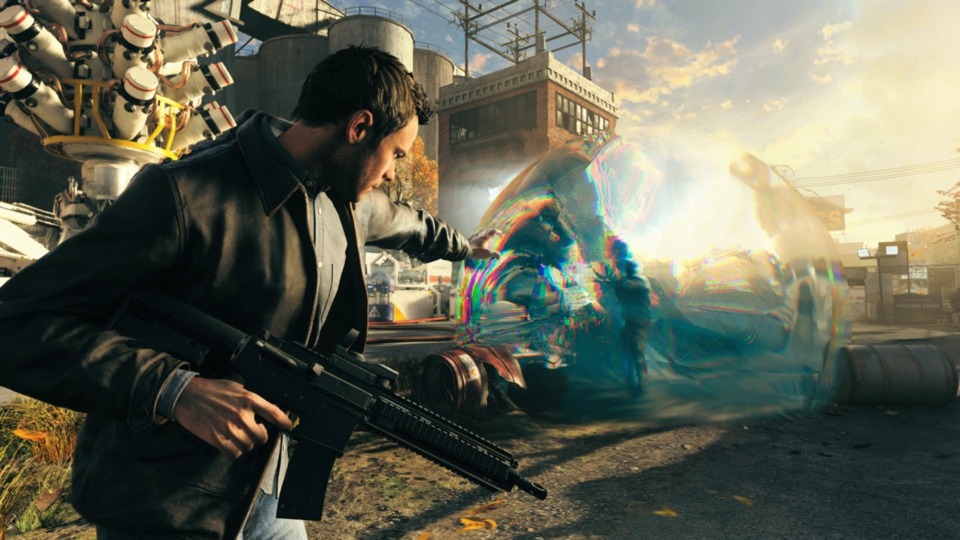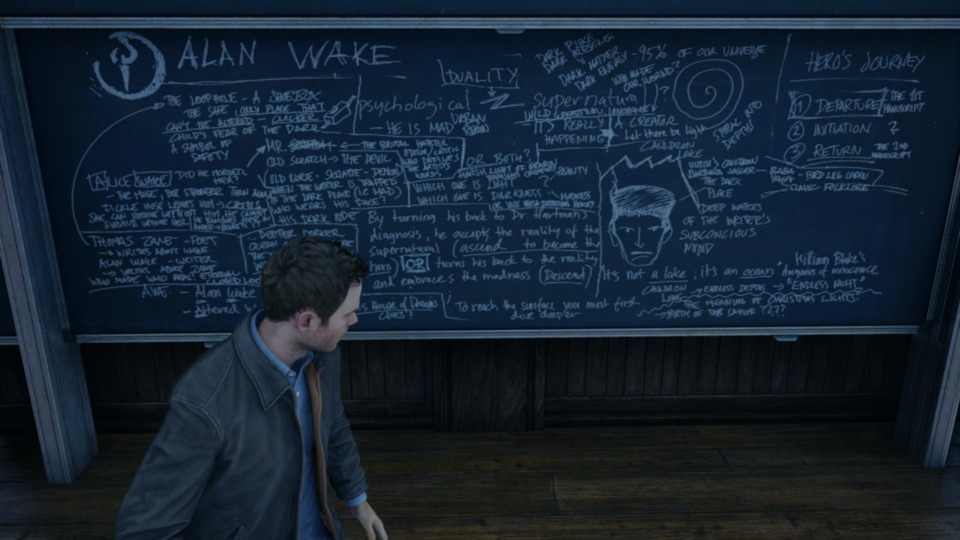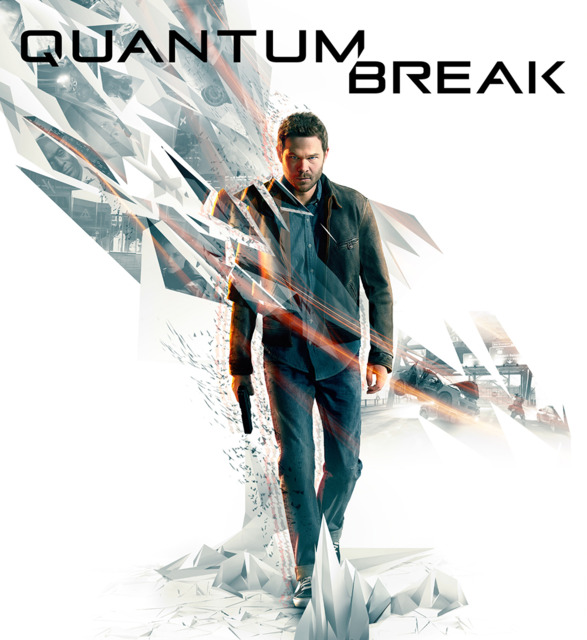An entertaining Remedy release weighed down by an amateurish, uninteresting television component.

Remedy has earned quite the pedigree for themselves with Max Payne and Alan Wake. They are well known for melding cinematic elements and dramatic storytelling with fun shooter gameplay. With their newest game, Quantum Break, they took this pairing to the next level, hiring well-known Hollywood actors and filming actual episodes of a television show that intercut the game’s story. It felt like the inevitable outcome from the studio, and the pitch was an intriguing, if uncertain, one. The final product is an interesting experiment with some promising ideas, but it doesn’t manage to tie the two halves together in a way that benefits either.
In Quantum Break, you play as Jack Joyce. He left his hometown years ago after a fight with his older brother, with no intention of ever coming back. However, after a desperate message from old friend Paul Serene, he returns to help Paul with a secretive early morning time-machine experiment. Things immediately go wrong and time begins to break down, showering both of them in chronon radiation. Paul is forced into the future to experience an apocalyptic event where all time has stopped. He manages to claw his way back to the past and establishes the Monarch Corporation with his knowledge of what is to come. Everything he does is in service of a greater plan for stopping the end of the world, no matter what he has to do to succeed in that plan. Jack remains in the present, but his exposure gives him his own set of time-manipulation abilities. With these abilities, and a lot of gunplay, he fights back against Paul’s resignation that all events are set in stone and tries to find his own way to fix the fracture in time.
The core narrative of the game is weak, mostly due to the dullness of both Jack and Paul. Jack is a bland protagonist without any defining characteristics: he’s not funny, his VO is often flat, and none of his emotions feel believable. Paul, on the other hand, spends far too much time smugly telling you what he knows about the future and rarely does anything in the story, instead staying at a distance and letting others cause events to happen. Considering how much of the plot revolves around these two characters, their uninspired performances and boring traits really drag down the overall story. A few of the side characters are much stronger, but they don’t get enough time in the story, often quickly pushed out of the way for the events relating to the main characters. Also frustrating is the lack of impact the choices you make at key points throughout the story have. Aside from determining one of the minor characters you meet and some inconsequential elements of how the game’s final act plays out, they affect nothing but the most minor and throwaway of events. These “choices” culminate in a single predictable ending that neatly sweeps any conflicts under the rug and sets up for a potential sequel in the most uninteresting way possible.

Two things save the narrative from being entirely forgettable. One is the time travel, which has a rigid ruleset and sticks to it smartly. It utilizes some typical scenarios of the genre, such as revisiting past events from a new perspective, but avoids the typical plot holes that usually arise from having jumps in the timeline. I wouldn’t say it breaks any new ground, but as a fan of time travel stories in general, I was pleasantly entertained by what Remedy did. The other narrative strength is in the potential expanded fiction of the universe, most notably the idea of the End of Time. They hint at the nature of this event but never take you there to see it for yourself, instead only relating the horror to you through others’ experiences. One of these characters has a brutal arc related to the End of Time that was my favorite part of the game: hearing about their struggles in the future and seeing the toll it took on them made me care a great deal more about that character, despite the somewhat hurried pace of the reveal. The pasts of the characters related to the End of Time and the terrors of this apocalyptic setting are enticing ideas that I would love to see explored in another game.
After every act (except the final one), there is a 20-ish minute episode of the Quantum Break show you can watch. These episodes shift focus to a group of side characters and attempt to add detail to the world with a parallel plot that rarely interacts with the main narrative. Some of these characters are horrendous, spouting cringy jokes and banter that sometimes made me want to stab something into my ears. The one standout is Lance Reddick, who plays Paul Serene’s right-hand man Martin Hatch. At times, it feels like he’s the only one who gives a damn about his performance, and he does a great job at delivering malicious lines from behind a mask of calm confidence. Aside from his scenes, I found little reason to want to watch over an hour of this essentially unnecessary side story.
The show is also remarkably plain from top to bottom. While the footage looks sharp from a fidelity standpoint, the whole production feels like a low-budget project from random people on the Internet, not something made by actual television show creators. The environments have a sterile look. The awkward fight choreography is filmed too close and looks unrealistic. The special effects don’t fit naturally in the scenes whatsoever. These episodes feel like the jokey imitations of television that Remedy played with in their past titles, a damning comparison considering this was the game that was finally supposed to make good on that melding of television and video games. They just don’t make the case for such a pairing and would have likely been better, and cheaper, as in-game cutscenes instead.

The core gameplay of Quantum Break is typical third-person shooting that feels reminiscent of Remedy’s prior works. You have a variety of weapons to use, carrying three at a time, as well as a little something extra: instead of the slow-motion diving of Max Payne or the light mechanics of Alan Wake, you have an array of time-manipulation powers to use in combat. These powers, ranging from stopping time in a localized area to dashing about from cover to cover, do a good job of making Jack feel more powerful than the enemies he faces. The more hectic of these encounters are a frenetic challenge, forcing you to stay on the move with your dodges and take potshots as your time powers recharge. It all feels pretty good, fitting nicely in the middle of Remedy’s offerings between Max Payne’s perfect gunplay and Alan Wake’s sluggish combat.
There are a few notable annoyances, though. The upgrades to your powers, which you get by finding collectibles, are minimal. They don’t do anything meaningful to their effectiveness, other than lowering cooldowns, and a few of them feel like they don’t do anything at all. A bigger problem is in the feedback you get in combat. The red highlight you get notifying you of imminent death is inconsistent, sometimes not appearing at all or disappearing despite your health still being low. I died multiple times seemingly out of nowhere due to this. There are also a handful of times in the game where enemies can resist your time powers. While this is usually noted by a red bubble around the enemy in question, I found them ineffective against regular enemies in certain situations as well with no real clue as to why they weren’t working. Finally, close-up combat is a nightmare, with shots being impossible to line up despite the crosshair being red. These are all minor issues that do little to hurt the game as a whole, but they still caused me some frustration.
Quantum Break has its pretty moments, particularly during the time stutters where everything jerks back and forth as time threatens to start up again. A few of these setpieces are breathtaking, with countless objects hanging in the air and the fractal distortions dancing around everything. Unfortunately, the whole game suffers from a blurry look, mostly due to the way Remedy rendered the game by using multiple frames of 720p melded together to achieve a 1080p look. It’s one of those things that you’ll either never notice or will drive you slightly nuts. It is possible to turn this off on the PC version, but the necessary horsepower to run it at native resolution is massive, making it unlikely at even 1080p for most. The motion capture is also hit-or-miss, with certain characters looking fairly lifelike and others looking like soulless puppets. Jack’s eyes and mouth are particularly rough, despite being the main character.

Although it is used sparingly, the score of Quantum Break is fantastic. It is most notable during combat, with a powerful and energizing track that nicely fits the flow of the encounters. The rest of the score is great too, mostly used for the more dramatic story moments and adding a punch of emotional resonance. There are also some licensed songs, but they are only used at the ends of acts (except for one instance). They play over a static “end of act” screen and feel utterly unnecessary, adding nothing to the game other than feeling like an end credits song minus the actual credits. Remedy included an option to turn off the licensed music for streamers, a smart addition that more games should copy, but they could have just avoided including it in the first place.
For most of Quantum Break’s 10 hours, I had a thoroughly enjoyable time. The gameplay was good, the setpieces were fun, and the parts of the narrative I cared about were frequent enough to ignore the more boring characters. This made the numerous breaks to watch 20 minutes of low-quality television before being able to move on nothing short of infuriating. I appreciate what Remedy tried to do here, as I think the idea is an exciting one that could lead to some truly amazing moments of interplay between two mediums. Sadly, they failed on pretty much every count, creating a television component that few will want to suffer through. It’s a shame that it drags down the solid game half simply by existing, as there is a promising future for more Quantum Break content. Let’s just hope that future doesn’t involve more tedious television that no one wants to watch.
